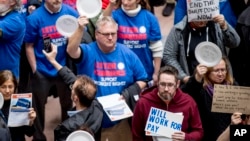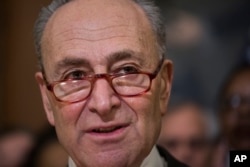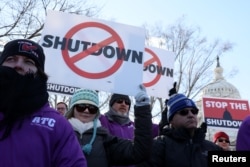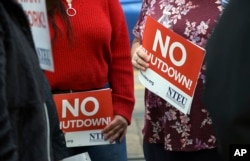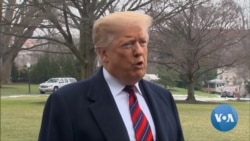As the partial shutdown of the U.S. government goes into a second month, neither side can be sure about the long-term political fallout. Public opinion polls show more Americans blame President Donald Trump than opposition Democrats at the moment, and to some the standoff is already serving as a likely blueprint for the 2020 presidential election battle.
The longer the shutdown drags on, however, the more uncertainty there is about its eventual political impact.
"Trump is losing on this, Congress is losing on this, and then federal workers, who are without pay, are losing on this," said Jim Kessler of Third Way, a center-left public advocacy group in Washington.
Wall or bust
President Trump remains adamant about funding for a wall along the southern border, a key campaign promise from 2016. "I hope that Speaker (Nancy) Pelosi can come along and realize what everybody knows, and no matter who it is, they know that walls work, and we need walls," Trump told reporters last Saturday as he left the White House.
For their part, Democrats remain firmly opposed to wall funding, including Senate Democratic leader Chuck Schumer.
"We want the symbol of America to remain the Statue of Liberty, freedom, equality, not a divisive wall. And we will fight for that. Fight for that we will."
On Thursday, the Senate will vote on competing proposals to end the shutdown, one from the White House and Republicans, the other from Democrats. As of now, neither proposal is expected to garner the 60 Senate votes necessary to pass, though some in both parties see the votes as a possible beginning step toward more serious negotiations.
Workers hurting
In the meantime, those who remain caught in the middle are government workers who are either on furlough or working without pay.
"FBI agents should not have to go work at a store stocking shelves because they can't feed their families on their government job," said Tom O'Connor, president of the FBI Agents Association."
A similar sentiment was expressed by Transportation Security Administration screener Neal Gosman at a news conference in Minnesota.
"We, the Coast Guard, the Border Patrol and other folks that make this country safe and secure, we don't get that much money; but, we should be paid for it," Gosman told reporters.
Public weighs in
Several recent polls have put more of the blame for the shutdown on Trump, noted John Fortier of the Bipartisan Policy Center in Washington.
"Public opinion polls, I think, are more against the president than against the Democrats," said Fortier. "His numbers have suffered, but just a small amount. And so I think both sides feel their bases are committed to these differences in principle and that makes solving this much more difficult."
A new poll Wednesday from Morning Consult/POLITICO found that 54 percent blamed President Trump and congressional Republicans for the shutdown, while 35 percent blamed congressional Democrats.
The poll also found that the president's approval rating fell to 40 percent, with 57 percent disapproving. That is the highest share of voters in that poll showing disapproval since Trump's inauguration.
Overall, the president's approval rating has suffered during the shutdown, dropping from an average of around 43 percent last month to around 40 percent this year.
A new CBS poll also found that by a margin of 71 to 28 percent, voters believe that money for a border wall is not worth shutting down the government.
WATCH: Shutdown drags on
Both sides dig in
Given their standing in the polls, Democrats appear unified to defy the president, said Jim Kessler.
"Democrats are not really eager to fund a campaign promise of Donald Trump that he said Mexico was going to pay for, and so we are locked in a duel right now and somebody is going to have to blink or find a creative way out."
Many analysts believe Trump sees delivering on his promise of a wall as a key component of his re-election campaign for 2020.
"It is hard to see how it will end, but it is bound to end," said University of Virginia expert Larry Sabato via Skype. "And both sides will have to give something. Exactly what they will give is just a question mark right now."
The longer the shutdown impasse drags on, the more likely it could define divided government over the next two years as well as serving as a likely preview of next year's presidential campaign.




